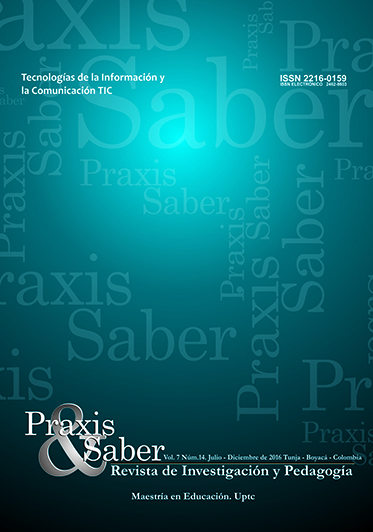Competency Evaluation With the Supp ort of a Learning Management System

Abstract
This paper presents the results of a correlational descriptive research for two purposes defined, on the one hand, analyze student opinion regarding the contribution of the methodology of evaluation of training projects for process skills training are presented, on the other side, make a comparative analysis between the results of the evaluation of evidence by students and teacher assessment. The experiment was conducted with students in a course of formal logic undergraduate program Systems Engineering and Computer Science, Universidad del Quindío, Colombia. To support the skills assessment process, it developed a new technology component that is incorporated as a block to learning management system Moodle. Work results support the conclusion that students consider that active participation in the evaluation process contributes to the development of the skills of the course. Regarding the results of the evaluation of evidence, it was identified that there is statistically significant between the evaluation by students and teacher assessment difference.Keywords
evaluation, competence, evidence, formative projects.
Author Biography
Sergio Augusto Cardona Torres
Magister en Ingeniería
Sonia Jaramillo Valbuena
Estudiante de Doctorado en Ingeniería
Yadira Navarro Rangel
Doctora en Educación Superior
References
- Almond, R., Steinberg, L. & Mislevy, R. (2002). A four-process architecture for assessment delivery, with connections to assessment design (Vol. 2002). Princeton: Educational Testing Service.
- Álvarez, I. (2008). La coevaluación como alternativa para mejorar la calidad del aprendizaje de los estudiantes universitarios. Revista Universitaria Para La Formación del Profesorado, 22(3), 127–140.
- BAARTMAN, L. K. J., BASTIAENS, T. J., KIRSCHNER, P. A. & VAN DER VLEUTEN, C. P. M. (2007). Evaluating assessment quality in competencebased education: A qualitative comparison of two frameworks. Educational Research Review, 2(2), 114–129. doi:10.1016/j.edurev.2007.06.001
- https://doi.org/10.1016/j.edurev.2007.06.001
- Brahim, E. F., Mohammed, K. I. & Samir, B. (2010). A formative assessment model within the competency-based-approach for an individualized e-learning path. World Academy of Science, Engineering and Technology, 40, 208-212.
- Campbell, D. & Stanley, J. (1966). Experimental and quasi-experimental designs for research. Boston: Houghton Mifflin Company.
- ĆUKUŠIĆ, M., GARAČA, Ž. & JADRIĆ, M. (2014). Online self-assessment and students' success in higher education institutions. Computers & Education, 72, 100–109. doi:10.1016/j.compedu.2013.10.018
- https://doi.org/10.1016/j.compedu.2013.10.018
- DOCHY, F., SEGERS, M. & SLUIJSMANS, D. (1999a). The use of self-, peer and co-assessment in higher education: A review. Studies in Higher Education, 24(3), 331–350. doi:10.1080/03075079912331379935
- https://doi.org/10.1080/03075079912331379935
- DOCHY, F., SEGERS, M. & SLUIJSMANS, D. (1999b). The use of self-, peer and co-assessment in higher education: A review. Studies in Higher Education, 24(3), 331–350. doi:10.1080/0307507991 2331379935
- Fiallos, Z. & Maradiaga, N. (2011). La incorporación del estudiante a su evaluación; la situación en la UPN. Paradigma : Revista de Investigación Educativa, 20(30), 65–75.
- Florián, B., Baldiris, S. & Fabregat, R. (2010). A new competencybased e-assessment data model. In Education Engineering (EDUCON) (pp.473–480). Madrid: IEEE.
- García, M. J. (2010). Dise-o y validación de un modelo de evaluación por competencias en la universidad. Barcelona: Universitat Autónoma de Barcelona.
- GIKANDI, J. W., MORROW, D. & DAVIS, N. E. (2011). Online formative assessment in higher education: A review of the literature. Computers and Education, 57(4), 2333–2351. doi:10.1016/j.compedu.2011.06.004
- https://doi.org/10.1016/j.compedu.2011.06.004
- GOBIERNO NACIONAL DE COLOMBIA. (2012). Ley colombiana estatutaria 1581 del 2012. Bogotá, D.C.
- Hall, K. (1995). Co-assessment: participation of students with staff in the assessment process. In 2nd European Electronic Conference on Assessment and Evaluation. European Academic & Research Network (EARN).
- Kilpatrick, W. H. (1918). The Project Method. Teachers College, 19, 319–335.
- Mcdonald, R., Boud, D., Francis, J. & Gonnczi, A. (2000). Nuevas perspectivas sobre la evaluación. Boletín de Cinterfor, 149, 41–72.
- MINISTERIO DE COMERCIO, INDUSTRIA TURISMO. (2013). Decreto 1377 - Régimen general para la protección de datos personales. Bogotá, D.C.
- Olmos, S. (2008). Evaluación Formativa y Sumativa de estudiantes universitarios: Aplicación de las Tecnologías a la Evaluación Educativa. Universidad de Salamanca.
- PANADERO, E. & JONSSON, A. (2013). The use of scoring rubrics for formative assessment purposes revisited: A review. Educational Research Review, 9, 129–144. doi:10.1016/j.edurev.2013.01.002
- https://doi.org/10.1016/j.edurev.2013.01.002
- ROBINSON, J. (1965). A Machine-Oriented Logic Based on the Resolution Principle. Journal of the ACM (JACM), 12(1), 23–41.
- https://doi.org/10.1145/321250.321253
- Sahin, S. (2008). An application of peer assessment in higher education. The Turkish Online Journal of Educational Technology, 7(2), 5–10.
- Sánchez, J., Ruiz, J. & Sánchez, E. (2011). Análisis comparativo de evaluación entre pares con la del profesorado. Un caso práctico. Docencia e Investigación, 36(21), 11–24.
- SUNG, Y., CHANG, K.-E., CHIOU, S.-K. & HOU, H.-T. (2005). The design and application of a web-based self- and peer-assessment system. Computers & Education, 45, 187–202. doi:10.1016/j.compedu.2004.07.002
- https://doi.org/10.1016/j.compedu.2004.07.002
- Tobón, S. (2005). Formación basada en competencias (ECOE.). Bogotá.
- TOBÓN, S. (2010). Formación integral y competencias (Tercera Ed.). Bogotá: ECOE Ediciones.
- TOBÓN, S. (2013a). Formación integral y competencias (Tercera Ed.). Bogotá: ECOE Ediciones.
- TOBÓN, S. (2013b). La evaluación de las competencias en la educación básica (Segunda ed.). México: Editorial Santillana.
- Torres, J. & Perera, V. (2010). La rúbrica como instrumento pedagógico para la evaluación de los aprendizajes. Revista de Medios y Educación, 36, 141–149.
- VAN DEN BERG, U., Admiraal, W. & Pilot, A. (2006). Design Principles and Outcomes of Peer Assessment in Higher Education. Studies in Higher Education, 31(3), 341–356.
- https://doi.org/10.1080/03075070600680836
- VAN DEN BERGH, V., MORTELMANS, D., SPOOREN, P., VAN PETEGEM, P., GIJBELS, D. & VANTHOURNOUT, G. (2006). New assessment modes within project-based education - the stakeholders. Studies in Educational Evaluation, 32(4), 345–368. doi:10.1016/j.stueduc.2006.10.005
- https://doi.org/10.1016/j.stueduc.2006.10.005
- VILLARDÓN, L. (2006). Evaluación del aprendizaje para promover el desarrollo de competencias. Educatio Siglo XXI, 24, 57–76.
- Zabalza, M. (2007). Competencias docentes del profesorado universitario. Madrid: Editorial Narcea.
Downloads
Download data is not yet available.